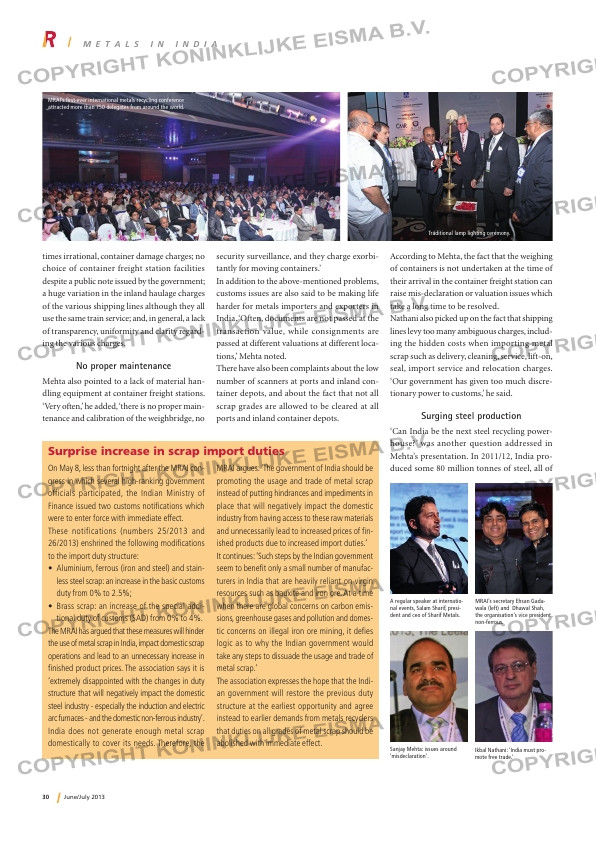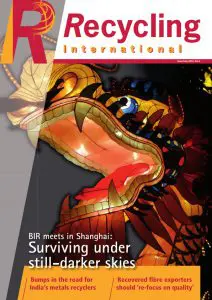Page 30 from: June / July 2013

30 June/July 2013
times irrational, container damage charges; no
choice of container freight station facilities
despite a public note issued by the government;
a huge variation in the inland haulage charges
of the various shipping lines although they all
use the same train service; and, in general, a lack
of transparency, uniformity and clarity regard-
ing the various charges.
No proper maintenance
Mehta also pointed to a lack of material han-
dling equipment at container freight stations.
‘Very often,’ he added, ‘there is no proper main-
tenance and calibration of the weighbridge, no
security surveillance, and they charge exorbi-
tantly for moving containers.’
In addition to the above-mentioned problems,
customs issues are also said to be making life
harder for metals importers and exporters in
India. ‘Often, documents are not passed at the
transaction value, while consignments are
passed at different valuations at different loca-
tions,’ Mehta noted.
There have also been complaints about the low
number of scanners at ports and inland con-
tainer depots, and about the fact that not all
scrap grades are allowed to be cleared at all
ports and inland container depots.
On May 8, less than fortnight after the MRAI con-
gress in which several high-ranking government
officials participated, the Indian Ministry of
Finance issued two customs notifications which
were to enter force with immediate effect.
These notifications (numbers 25/2013 and
26/2013) enshrined the following modifications
to the import duty structure:
• Aluminium, ferrous (iron and steel) and stain-
less steel scrap: an increase in the basic customs
duty from 0% to 2.5%;
• Brass scrap: an increase of the special addi-
tional duty of customs (SAD) from 0% to 4%.
The MRAI has argued that these measures will hinder
the use of metal scrap in India, impact domestic scrap
operations and lead to an unnecessary increase in
finished product prices. The association says it is
‘extremely disappointed with the changes in duty
structure that will negatively impact the domestic
steel industry – especially the induction and electric
arc furnaces – and the domestic non-ferrous industry’.
India does not generate enough metal scrap
domestically to cover its needs. Therefore, the
MRAI argues: ‘The government of India should be
promoting the usage and trade of metal scrap
instead of putting hindrances and impediments in
place that will negatively impact the domestic
industry from having access to these raw materials
and unnecessarily lead to increased prices of fin-
ished products due to increased import duties.’
It continues: ‘Such steps by the Indian government
seem to benefit only a small number of manufac-
turers in India that are heavily reliant on virgin
resources such as bauxite and iron ore. At a time
when there are global concerns on carbon emis-
sions, greenhouse gases and pollution and domes-
tic concerns on illegal iron ore mining, it defies
logic as to why the Indian government would
take any steps to dissuade the usage and trade of
metal scrap.’
The association expresses the hope that the Indi-
an government will restore the previous duty
structure at the earliest opportunity and agree
instead to earlier demands from metals recyclers
that duties on all grades of metal scrap should be
abolished with immediate effect.
Surprise increase in scrap import duties
According to Mehta, the fact that the weighing
of containers is not undertaken at the time of
their arrival in the container freight station can
raise mis-declaration or valuation issues which
take a long time to be resolved.
Nathani also picked up on the fact that shipping
lines levy too many ambiguous charges, includ-
ing the hidden costs when importing metal
scrap such as delivery, cleaning, service, lift-on,
seal, import service and relocation charges.
‘Our government has given too much discre-
tionary power to customs,’ he said.
Surging steel production
‘Can India be the next steel recycling power-
house?’ was another question addressed in
Mehta’s presentation. In 2011/12, India pro-
duced some 80 million tonnes of steel, all of
MRAI’s first-ever international metals recycling conference
attracted more than 750 delegates from around the world.
Sanjay Mehta: issues around
‘misdeclaration’.
Ikbal Nathani: ‘India must pro-
mote free trade.’
Traditional lamp lighting ceremony.
MRAI’s secretary Ehsan Gada-
wala (left) and Dhawal Shah,
the organisation’s vice president
non-ferrous.
A regular speaker at internatio-
nal events, Salam Sharif, presi-
dent and ceo of Sharif Metals.
M e t a l s i n i n d i a
RI-5_MRAI.indd 30 17-06-13 16:06



